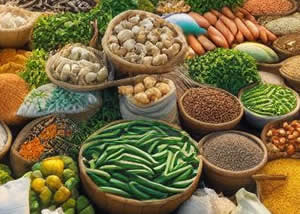The agri-food system is at the heart of a complex challenge: how to provide healthy and sustainable diets to a growing global population. Today, nearly 830 million people go to bed hungry, while small farmers, herders, and fishermen – who produce 70% of the world’s food – face poverty and food insecurity.
Our agri-food systems face severe environmental and socio-economic challenges, including climate change, biodiversity loss, social conflict and economic downturns that are exacerbating pressures and affecting the most vulnerable livelihoods.
At Zero Energy, we believe that the only way to tackle these challenges is to transform our agri-food systems. Our work in the sector is driven by a commitment to building sustainable, equitable, and resilient systems. We have identified three impact goals to achieve this:
1. Improving food security and healthy diets by enhancing the availability, affordability, accessibility, acceptability, and attractiveness of nutritious food, and by reducing food waste..
2. Achieving sustainable agri-food production by contributing to the sustainable use of natural resources, increasing climate-resilient production, and reducing food losses in production.
3. Increasing economic participation and social inclusion by building resilient livelihoods with improved incomes and dignity.
In line with Sustainable Development Goal 2, we leverage our deep knowledge of local agri-food systems to deliver on these goals. Our goal is to support the equitable transition to a sustainable and resilient agri-food system that delivers food security and adequate nutrition for people in all their diversity in such a way that the economic, social, and environmental bases are safeguarded for future generations. To do this, our work is organised around four approaches, and through them, we help communities to build sustainable, equitable, and resilient agri-food systems that meet their needs today and in the future.
In line with Sustainable Development Goal 2, we leverage our deep knowledge of local agri-food systems to deliver on these goals. Our goal is to support the equitable transition to a sustainable and resilient agri-food system that delivers food security and adequate nutrition for people in all their diversity in such a way that the economic, social, and environmental bases are safeguarded for future generations. To do this, our work is organised around four approaches, and through them, we help communities to build sustainable, equitable, and resilient agri-food systems that meet their needs today and in the future.

